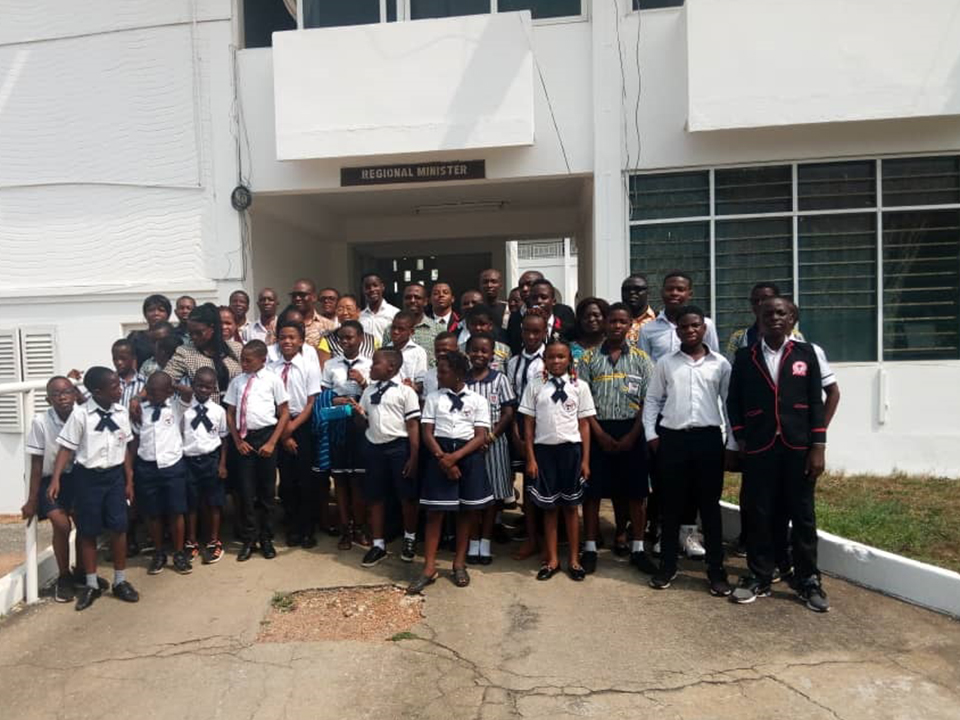The Institute of Education has held the 7th Excellence Award ceremony for the 2016/17 academic year on the theme “The Teacher: An Agent of National Development”.
Five national and 15 zonal awardees were presented with cash, laptops and printer; and citations.
In his welcome address, the Director of the Institute, Prof. Frederick Ocansey, said the Professional Board of institute has expanded the scope and coverage of the awards by increasing the number of awardees to 20 from the previous 10. This comprises five national award winners and three winners from each of the five zones.
The Director announced that a total of 190 students of the 2016/17 graduating cohort had first class which he described as “a remarkable improvement over the previous results”. This, he said meant that the ceremony was been held for the “best of the best” adding: “your perseverance and hard work has really paid off”.
Prof. Ocansey reminded them that they were examples to their peers, it was, therefore, expedient for them to continue to demonstrate virtues of hard work, discipline, commitment and respect for others to emulate. “The awards are not just an event, but to encourage others to perform at the same level”.
The Guest Speaker for the occasion, Mr. Lloyd Alexander Djangmah, said teachers had a vital role in nation building because the future was totally in their hands. “They choose to be the fortune builders of the country and if you really want to know how important teachers are to the country, try imagining a nation without them”.
“It will only be a nation of utter chaos, where nobody will step up to make sure the kids get the best education and knowledge to sustain a good healthy life. The nation will no longer be able to progress and the population will suffer”, he stated.
The former Principal of Offinso College of Education, said only the best and most intelligent and competent members of our intelligentsia be allowed to practice the noble profession, bearing in mind that “the quality of a nation depends on the quality of its educational system and its teachers”.
Continuing, the guest speaker said: “In the development of a country, great attention has to paid to education and learning, as well as good morals, and nobody is suited to push or execute this process but the ‘teacher’. Without the teacher, both knowledge and morals would suffer”.
Mr. Djangmah noted that students/pupils were affected by the teacher’s love and affection, his or her character, competence and moral commitment. “Most teachers become role models for their pupils. They try to follow his or her manners, customs, etiquette and style of conversation”.
Concluding, Mr. Djangmah said “A good teacher can inspire hope, ignite the imagination and instill a love of learning. Let us remember: One book, one pen, one child and one teacher can change the world”.
Advising the award winners, the Pro Vice-Chancellor, Prof. George K. T. Oduro told the awardees that excellence must not be limited to writing examination alone but must permeate their entire lives so it would affect their pupils and society at large.
Again, he admonished the awardees to humble themselves always since “humility can send them to where money cannot”.
He asked them to use their teaching periods to the benefit of their pupils instead of browsing the internet.
The Vice-Chancellor, Prof. Joseph Ghartey Ampiah disclosed that the University through the Institute would provide scholarship to the five national awardees to pursue post diploma degree in basic education. He said they want to desist from the practice where students pursue Diploma in Basic Education but divert to do other courses. “It is not good to do Basic Education then you turn to something else afterwards for post diploma. It must be in the same area”.
The Provost of the College of Education Studies, Prof. Eric Wilmot, who chaired the ceremony, told the awardees to look forward into the future and build the character of the next generation of Ghanaians. Prof. Wilmot was particularly happy that seven out of the awardees were women and said he was looking forward to a time when there would be parity in gender of awardees.

